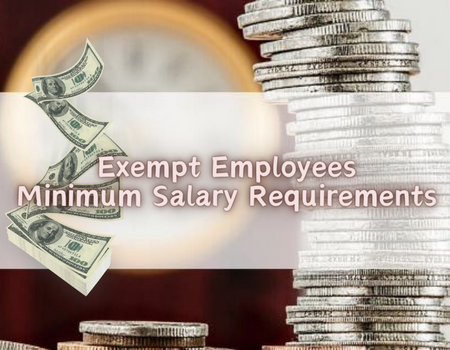Call us: +1-855-202-3299
Email: [email protected]
Coming Soon - New Minimum Salary Levels for Exempt Employees, Are You Ready?
Speaker: Robert B McKenzie
Speaker Designation: President, McKenzieHr

Call us: +1-855-202-3299
Email: [email protected]
Speaker: Robert B McKenzie
Speaker Designation: President, McKenzieHr

The Department of Labor recently released its long-awaited proposal to increase the minimum salary to qualify for exempt status from $684 per week to $1,059 per week or from $35,568 to $55,068 annually. These changes have not become law yet, but something close to it will soon. It is now time for organizations to plan for these changes.
The Fair Labor Standards Act (FLSA) is one of the most misunderstood employment laws in the country. Basically, it governs the payment of wages and who must be paid overtime. To make things more confusing, the Department of Labor has implemented a number of exemptions to the requirement to pay overtime such as the White-Collar Exemptions and the 7(i) exemption for retail and service establishments. The DOL also allows different ways of computing overtime pay.
Alaska, California, Colorado, Maine, New York and Washington have developed their own rules that are different from Federal Law. Thirty-three states have implemented minimum wages that are higher than the Federal Minimum wage of $7.25 per hour. In addition, many municipalities have their own minimum wage laws.
Many organizations do not understand their responsibilities with regard to what types of positions qualify as white-collar exemptions, how to handle commissions, shift differential and production bonuses for hourly employees, and other nuances of complying such as handling training and travel time.
The FLSA is a Federal Law, but employers must know that many states, municipalities, and any type of governmental contract may have their own rules regarding minimum wage and overtime.
Navigating the new minimum salary levels for exempt employees requires diligence, attention to detail, and a proactive approach to compliance. By understanding the regulatory landscape, implementing necessary adjustments, and fostering open communication with employees, employers can mitigate risks and ensure a fair and compliant workplace environment.
Maintaining compliance is critical to your business. Failing to do so can cost hundreds of thousands of dollars.
Major Topics Covered:
In the landscape of employment regulations, the determination of who qualifies as exempt or non-exempt from overtime pay under the Fair Labor Standards Act (FLSA) is a crucial matter for employers. One of the primary criteria for exemption status is the salary level test, which mandates that exempt employees must earn a minimum salary amount to be exempt from overtime pay requirements.
Historically, the U.S. Department of Labor (DOL) periodically revises these salary thresholds to align with economic conditions and ensure fair compensation practices. Understanding and adhering to these standards is essential for employers to avoid legal repercussions, maintain compliance, and foster positive employee relations.

Bob McKenzie, has over 40 years of human resources management experience. His background includes a wide range of hands-on experience in all areas of Human resources management in all types of industries within the public and private sectors.
Bob has been cited in a number of Human Resources trade publications. Among them are HR.com, HR Magazine, HR Florida Review, Vault.com, BNA and the Institute of Management and administration and the Business Journal. He has been a speaker at a number of conferences as well as audio and web-based seminars.
Bob is a graduate of Rider University where he received a Bachelor of Science in Commerce Degree and double majored in Industrial Relations and Organizational Behavior.